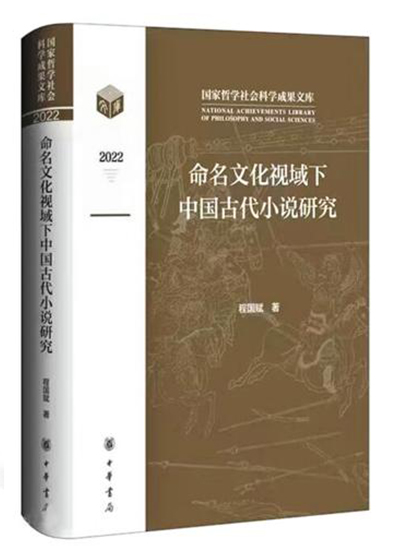Naming culture in ancient Chinese fiction

A Study of Ancient Chinese Fiction from the Perspective of Naming Culture
Renowned modern scholars Wang Guowei (1877–1927) and Lu Xun (1881–1936) pioneered the study of ancient Chinese fiction with modern concepts a century ago. Since then, China has witnessed generations of eminent scholars and the emergence of a modern academic landscape.
A Study of Ancient Chinese Fiction from the Perspective of Naming Culture, by Cheng Guobin, a professor from the College of Liberal Arts at Jinan University, explores ancient Chinese fiction from the perspective of naming culture, examining aspects such as book titles, character names, place names, article names, and official titles. This comprehensive study represents a reliable examination on the forms, methods, features, and cultural connotations of ancient novel naming, as well as related literary concepts, historical traits, readership, and market laws.
Cheng’s work can be regarded as a comprehensive culmination of over a century of research on novel naming. According to incomplete data, there have been 396 academic papers (including eight masters’ theses) and four monographs on the subject. However, works like Sheng Xunchang’s Nicknames in the Water Margin, Di Shengjian’s The Mystery of Character Names in A Dream of Red Mansions, Chi Fei’s A Discussion of Character Names in A Dream of Red Mansions, and Li Xiaolong’s A Study on the Titles of Ancient Chinese Fiction, each address only specific aspects of novel naming, lacking a holistic view. Individual papers naturally address only individual, specific issues. In contrast, Cheng expands the range of naming studies to encompass the entirety of ancient Chinese fiction, focusing not only on case studies, but also on the overall characteristics and conventions of novel naming.
In his examination of novel naming, Cheng’s work covers a broad historical scope, including Tang (618–907) and Ming (1368–1644) fiction, precisely representing two critical development periods of ancient Chinese fiction. Specifically, he conducts respective research on the naming of pre-Tang fiction, Tang and Five Dynasties (907–960) fiction, Song (960–1279) and Yuan (1271–1368) scripts for storytelling, and Ming and Qing (1644–1911) popular fiction. At the same time, Cheng elaborates on the cultural connotations of novel naming from its relationship with the Imperial Examination culture, taboo culture, folk culture, and publishing culture. When exploring the literary concepts behind novel naming, he creatively puts forward the theory of supplementing historical records, the theory of exhortation, the theory of entertainment, and the theory of affections.
Wang Qizhou is a professor from the School of Chinese Language and Literature at Central China Normal University.
Edited by YANG LANLAN
